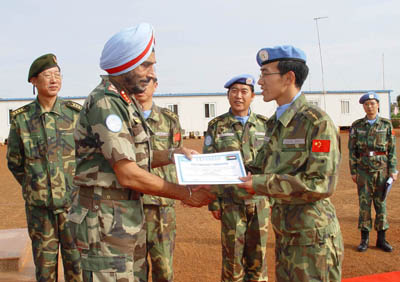Engineering peace, prosperity in Darfur
Updated: 2007-09-17 07:25
At the end of a dusty narrow path cutting through a stretch of cornfields on the outskirts of Qingyang, an obscure town in Henan Province, looms a 3-hectare ground dotted with green tents, armored cars and bulldozers. Over the past three months, 315 Chinese engineering troops have gone through the rigors of tough day-night training here. And in a month from now, they will travel more than 8,000 km to Darfur in Sudan to be part of a special UN peacekeeping mission.
 Commander of UN Mission in Sudan Lieutenant General Jasbir Singh Lidder (L) hands over Unit Citations to Chinese peacekeepers for their excellent performance at the base of the Chinese peacekeeping troops on September 12, 2007. [Xinhua] |
The drills the engineering troops, with the UN's blue berets, perform in front a group of reporters from home and abroad show what they are capable of. In about 10 minutes, bulldozers and road-rollers smoothen a potholed path and soldiers use bare hands to move a 40-meter stretch of steel bridge into place over a ditch. In less than that time, another squad builds a cabin with prefabricated aluminum walls and a "UN" symbol on its side. On show, too, are impressive wrestling and battlefield aid performances.
"The engineering unit is manned by sturdy, versatile soldiers, mainly from the Jinan Military Area," says Lieutenant Colonel Dai Shaoan, deputy director of the Ministry of National Defense's peacekeeping affairs office. "They have wide experience in building roads and bridges and are fully competent for the mission."
The Chinese troops are part of the "Annan Plan", a three-phased approach proposed by former UN secretary-general Kofi Annan to end the Darfur crisis. The plan calls for deploying a joint UN-African Union (AU) peacekeeping force in the 500,000-square-km arid Darfur region, plagued by conflicts over limited resources. Their deployment has been made possible after a hard-won diplomatic tug-of-war.
Dai says the UN invited China in April to dispatch a multi-functional engineering unit to Dafur. Four months later, the world body requested that the unit be dispatched in early October.
"We are doing the preparatory jobs in line with the prescribed timetable to guarantee smooth implementation of the peacekeeping operation," says engineering unit head Shangguan Linhong.
The force comprises three engineering platoons, a platoon each of well-diggers and 40 guards, a small hospital unit, 145 vehicles including excavators, bulldozers, road-rollers, power generators and armored personnel carriers, Shangguan says. All the vehicles are "brand new" from domestic companies and have undergone strict tests in line with UN standards.
Since its formation in mid-June, the engineering unit has attended intensive courses, from emergency aid to simulating heat in Darfur and from studying UN regulations to getting to know Sudanese culture. "Everyone in our unit can communicate in English to a certain extent," Shangguan says.
The UN raised the alarm on Darfur in 2003, and began looking for a lasting resolution to the ethnic conflict. The Darfur Peace Agreement (DPA) was signed in May 2006, thanks to intensive diplomatic and political efforts of the UN, AU and other partners. It took more than one year after that to persuade the Sudanese authorities to accept the UN-AU "hybrid" peacekeeping force.
President Hu Jintao met with his Sudanese counterpart Omar al-Bashir in Beijing last November and in Khartoum in February, and asked him to be flexible in his stance over Darfur and ensure that humanitarian aid was distributed properly among the refugees. In March, when Sudan and the UN differed over the implementation of the Annan Plan, China sent a special envoy several times to Khartoum to persuade the government to accept the UN resolution.
"I think the Sudanese government heeded China's advice," China's special representative for Darfur Liu Guijin said at a press conference in early July. Sudan agreed in June to have the "hybrid" force in Darfur after intense diplomatic efforts of the UN and the international community. Besides, China offered $10 million in humanitarian aid to Sudan, with the last installment leaving Tianjin last month.
The latest situation in Darfur is a mixture of good and bad. The UN says the mortality rate in the region is now below the emergency level because of the massive humanitarian efforts of the last four years. Also, malnutrition has been halved from mid-2004, when the crisis reached its peak.
But in June, the UN Environment Programme reported an "unprecedented" long-term climate change in northern Darfur, saying its impacts are closely linked to the conflict.
This is a real challenge for the Chinese engineering troops, but they are not unnecessarily perturbed. In fact, they are ready to overcome all obstacles on the road to peace.
"The challenges ahead of our peacekeeping troops are obvious," says Dai. Poor living conditions, lack of proper infrastructure and complex security situations are the obvious challenges. "But our army has a glorious tradition of being hard-working, particularly combat-worthy and of playing a contributory role."
Major Ma, an officer with the engineering troops, says Chinese soldiers see the UN peacekeeping operation as a glorious opportunity. "Implementing a mission so far from the country and being part of the efforts to maintain peace in the world is a unique experience."
All the soldiers in the battalion which Ma used to serve in the Jinan Military Area had applied to be part of the engineering unit for Darfur, and they included 18-year-old recruits, he says, and they had the full support of their families.
But is Ma worried about the dangers in Darfur? The major says: "What we think of most is how to do a nice job. Danger and difficulties are normal for servicemen."
|
|
|
||
|
||
|
|
|
|


